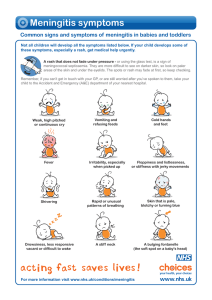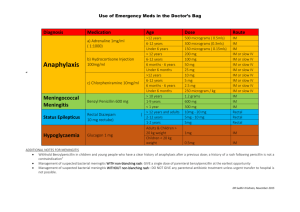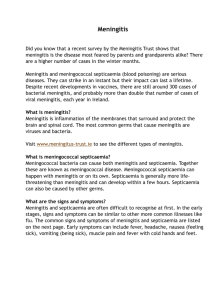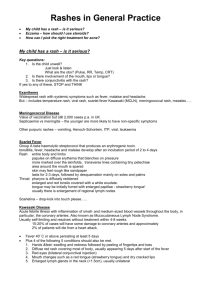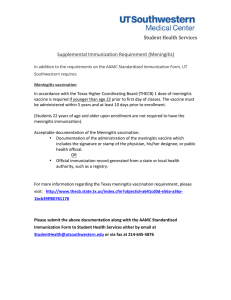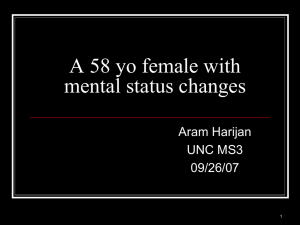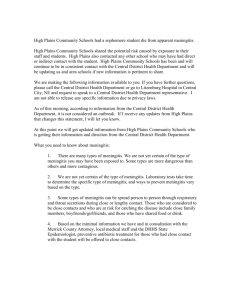I have now made a full recovery though
advertisement
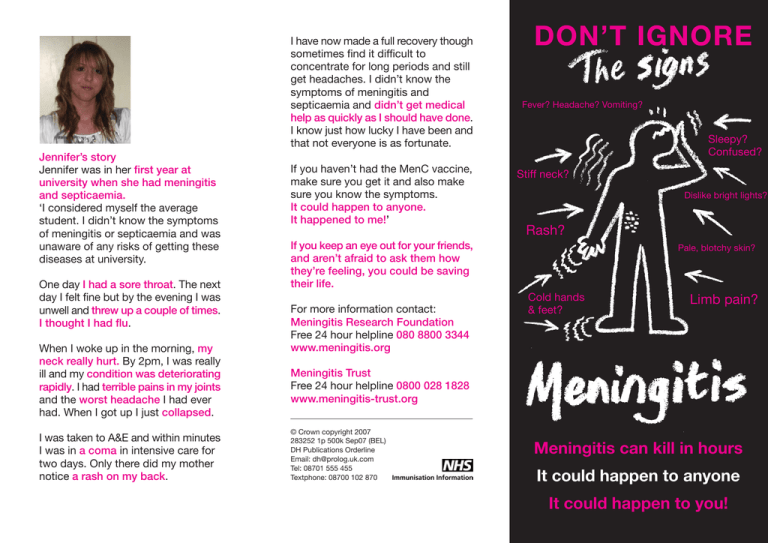
I have now made a full recovery though sometimes find it difficult to concentrate for long periods and still get headaches. I didn’t know the symptoms of meningitis and septicaemia and didn’t get medical help as quickly as I should have done. I know just how lucky I have been and that not everyone is as fortunate. Jennifer’s story Jennifer was in her first year at university when she had meningitis and septicaemia. ‘I considered myself the average student. I didn’t know the symptoms of meningitis or septicaemia and was unaware of any risks of getting these diseases at university. One day I had a sore throat. The next day I felt fine but by the evening I was unwell and threw up a couple of times. I thought I had flu. When I woke up in the morning, my neck really hurt. By 2pm, I was really ill and my condition was deteriorating rapidly. I had terrible pains in my joints and the worst headache I had ever had. When I got up I just collapsed. I was taken to A&E and within minutes I was in a coma in intensive care for two days. Only there did my mother notice a rash on my back. If you haven’t had the MenC vaccine, make sure you get it and also make sure you know the symptoms. It could happen to anyone. It happened to me!’ Fever? Headache? Vomiting? Sleepy? Confused? Stiff neck? Dislike bright lights? Rash? If you keep an eye out for your friends, and aren’t afraid to ask them how they’re feeling, you could be saving their life. For more information contact: Meningitis Research Foundation Free 24 hour helpline 080 8800 3344 www.meningitis.org Pale, blotchy skin? Cold hands & feet? Limb pain? Meningitis Trust Free 24 hour helpline 0800 028 1828 www.meningitis-trust.org © Crown copyright 2007 283252 1p 500k Sep07 (BEL) DH Publications Orderline Email: dh@prolog.uk.com Tel: 08701 555 455 Textphone: 08700 102 870 Meningitis can kill in hours It could happen to anyone It could happen to you! Be aware, be prepared The main signs and symptoms Meningitis and meningococcal septicaemia (blood poisoning) are serious diseases that can affect anyone at any time. Teenagers and students in particular, are at increased risk. Most young people in the UK have already had the MenC vaccine. If you haven’t or can’t remember, getting vaccinated now is a good way to protect yourself. Meningitis: fever very bad headache vomiting stiff neck dislike of bright lights rash confusion, delirium severe sleepiness, losing consciousness seizures But remember, vaccines can’t prevent all forms of meningitis and septicaemia. So it is very important that you are aware of the signs and symptoms so that you can get medical help urgently if you become ill. What are the signs and symptoms? Many of the early signs – vomiting, fever, aches, general tiredness and headaches – are also signs of less serious illnesses like colds and flu (see Jennifer’s story) but someone with meningitis or septicaemia will usually become seriously ill in a matter of hours. This is why it is very important to look out for the signs and symptoms and seek medical help urgently if you think you or someone else is developing meningitis or septicaemia. • • • • • • • • • • • • • • • • • • • Septicaemia: fever and shivering vomiting severe pains and aches in limbs and joints very cold hands and feet pale or mottled skin rapid breathing diarrhoea and stomach cramps red or purple spots/rash* that do not fade under pressure – do the glass test shown opposite difficulty walking or standing severe sleepiness, losing consciousness Not everyone will develop all these symptoms – they can appear in any order and be mixed between the two illnesses. *On dark skin, check inside the eyelids or roof of the mouth where the spots may be more visible. The glass test Press the side of a glass firmly against the rash so you can see if it fades under pressure. If it doesn’t fade, get medical help immediately. If you are feeling very ill, get help anyway, even if the rash fades or doesn’t appear at all. It’s important too to look for cold hands and feet, severe limb pain and pale and blotchy skin, as these tend to develop early in the illness. Symptoms such as a rash that doesn’t fade, being confused or delirious, or too sleepy to wake are very serious. How is meningitis spread? The bacteria that cause these diseases are spread by coughing, sneezing and intimate kissing. Most cases happen individually but outbreaks tend to occur where people live or work closely together, such as university halls of residence.
